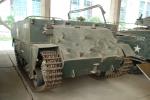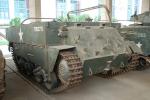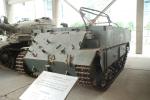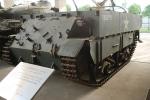
|
||||||||||||||||||||||||||||||||||
Article trouve sur Maple Leaf The RA expected six prototypes for trials in late 1944 but by December supply problems with the Cadillac engines had delayed production and the RA were told to look on the CT20 as a long term project with the Windsor Carrier taking over the role as an Armd.OP for Infantry Divisions until the mid 1950's. Trials carried out between then and July 1945 also showed up defects in the suspension that further delayed production and user trials. At this stage a production run of over 400 vehicles with the Cadillac engine was envisaged with further long term production planned using a British engine of around 180 bhp and the possibility of incorporating overhead cover. However the end of the War brought about a harsh review of all vehicle projects. Production was severely curtailed but CT20 continued to take place in several trials. In July 1946 it was demonstrated at the high profile "Exhibition of German and other vehicles and equipment" at Chertsey where it was seen as the future. It was described as "the latest type of British Carrier; its welded hull is much more spacious than that of the Universal Carrier. It employs "Cletrac" steering and a four speed hydromatic gearbox in conjunction with a 2-speed and reverse auxiliary box. The engine is a Cadilac V8 developing 110 bhp". It also took part in a suspension demonstration against a Coventry armoured car and a German 8 wheeled armoured car with unrecorded results. Change continued at an alarming rate due to the conflicting demands of post-war reductions and the development of the Cold War. Between August and November 1946 CT20 was used by the RA as a trials vehicle for a further development, the CT25. This was a later version of the CT20 with a Rolls-Royce engine and improved suspension to take the weight of overhead cover which was not possible on CT20. A mock up of the fighting compartment was also built on an Alecto chassis for design approval before FVDD Chobham produced a mock up on the new CT25 chassis. However by 1946 Vickers were developing a new family of light vehicles called CT26. The RA felt that this was too bulky to be an OP vehicle and too small to be a GPO vehicle but in February 1946 the War Office decided that all future field and medium SP guns were to be mounted on this chassis and therefore their associated vehicles. By September the RAC had changed their mind in favour of what was to become the FV300 series and so the RA also agreed to this series. Little else is known about the CT20/25 series from the RA point of view although the Oxford Carrier served on with the Infantry in various roles including that of a A/T gun tower and even saw service in Korea.
Voir AUssi See Also ICI HERE |
|
Droit d’auteur La plupart des photographies publiées sur ce site sont la propriété exclusive de © Claude Balmefrezol Elles peuvent être reproduites pour une utilisation personnelle, mais l’autorisation préalable de leur auteur est nécessaire pour être exploitées dans un autre cadre (site web publications etc) Les sources des autres documents et illustrations sont mentionnées quand elles sont connues. Si une de ces pièces est protégée et que sa présence dans ces pages pose problème, elle sera retirée sur simple demande. Principaux Collaborateurs:
Nb
de visiteurs:8906093 Nb
de visiteurs aujourd'hui:499 Nb
de connectés:42
| ||||||||||||||||||||||||||||||||










